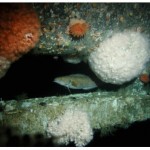Andrew J. Davies, J. Murray Roberts, Jason Hall-Spencer
Published in Biological Conservation (2007)
 Human activity in the deep sea is extending ever deeper, with recent research showing that this environment is more sensitive to human and natural impacts than previously thought. Some deep-water fish stocks have collapsed and fishing methods such as bottom trawling have raised international concern over the habitat damage they cause. It is likely that in its current form, deep-sea fishing is unsustainable. Diminishing reserves of hydrocarbons in shallow water are pushing exploration and production into deeper waters, which may cause damage to little known deep-sea habitats. The deep sea is also proposed as an environment where anthropogenic carbon dioxide could be stored to minimise the effect of its release into the atmosphere. At the same time, rising atmospheric carbon dioxide levels may be altering the chemical equilibrium of the global ocean by lowering pH. Many countries are now beginning to designate some deep-sea habitats as marine protected areas in measures to reduce the damage caused by fishing and other anthropogenic activities. This review examines these current and emerging issues in deep-sea conservation and discusses conservation status and the designation of protected areas. The enforcement of protected areas using satellite tracking of vessels is discussed and applied to an internationally agreed deep-water conservation area, which aims to protect cold-water coral habitats on the Darwin Mounds in the north east Atlantic Ocean.
Human activity in the deep sea is extending ever deeper, with recent research showing that this environment is more sensitive to human and natural impacts than previously thought. Some deep-water fish stocks have collapsed and fishing methods such as bottom trawling have raised international concern over the habitat damage they cause. It is likely that in its current form, deep-sea fishing is unsustainable. Diminishing reserves of hydrocarbons in shallow water are pushing exploration and production into deeper waters, which may cause damage to little known deep-sea habitats. The deep sea is also proposed as an environment where anthropogenic carbon dioxide could be stored to minimise the effect of its release into the atmosphere. At the same time, rising atmospheric carbon dioxide levels may be altering the chemical equilibrium of the global ocean by lowering pH. Many countries are now beginning to designate some deep-sea habitats as marine protected areas in measures to reduce the damage caused by fishing and other anthropogenic activities. This review examines these current and emerging issues in deep-sea conservation and discusses conservation status and the designation of protected areas. The enforcement of protected areas using satellite tracking of vessels is discussed and applied to an internationally agreed deep-water conservation area, which aims to protect cold-water coral habitats on the Darwin Mounds in the north east Atlantic Ocean.
Request PDF
| To request a PDF copy of this paper, please enter your email address below: Your email address is not stored, it is only used to send an email with an attached PDF to you. |
Full citation
Davies, A.J., Roberts, J.M. & Hall-Spencer, J. (2007) “Preserving deep-sea natural heritage: Emerging issues in offshore conservation and management” Biological Conservation 138: 299-312.
